
-
 86-21-63895588
86-21-63895588
-
 No.1, Lane 600, Nanchezhan Road, Huangpu District, Shanghai 200011
No.1, Lane 600, Nanchezhan Road, Huangpu District, Shanghai 200011
Release time:2025-04-30
Embodied Intelligence - a buzzword in recent years - refers to "intelligence with physicality." The most iconic example is humanoid robots, whose core technologies combine advance software and physical hardware.
On March 27, 2025, students from the Fulltime Finance MBA program at Fudan University’s International School of Finance (FISF) Class of 2024 embarked on an immersive innovation course titled "The L.I.T.E. Analysis On China's Hyper Drive For Technology Advancement 2025: Exploring How Shanghai Caohejing Hi-Tech Park Accelerates The Development of Humanoid Robotics Innovation With Ecosystem Building and Targeted Investments.”
Through policy analysis, corporate visits, and whitepaper co-creation, the Class of 2024 uncovered the "secret formula" behind China’s high-tech acceleration and shares the finding with the world.

The L.I.T.E. Course (Leadership, Innovation, Teamwork, Ethics) is a signature module for FISF’s Fulltime MBA (FMBA) program. It kicked off with a session led by Hydrogen Design Center founder and program mentor Allan Chou, who framed the course objectives for the one-day course (six hours). Despite global perceptions of China’s tech prowess, questions linger: Why can China develop DeepSeek a rival to ChatGPT at lower costs? Why is Unitree Robotics commercializing faster than MIT-backed Boston Dynamics? The answers lie not just in technical breakthroughs but in systemic factors like policy synergy, capital empowerment, and ecosystem-building. The humanoid robotics sector symbolizes China’s strategic ambitions in Embodied Intelligence, with Caohejing Hi-Tech Park - one of Shanghai’s top science and technology hub - offering a microcosm of end-to-end innovation from large-scale model training to commercialization.
Students adopted a “fresh perspective + professional analysis" approach, learning through expert talks, site visits, and ecosystem dissection. Key insights include:
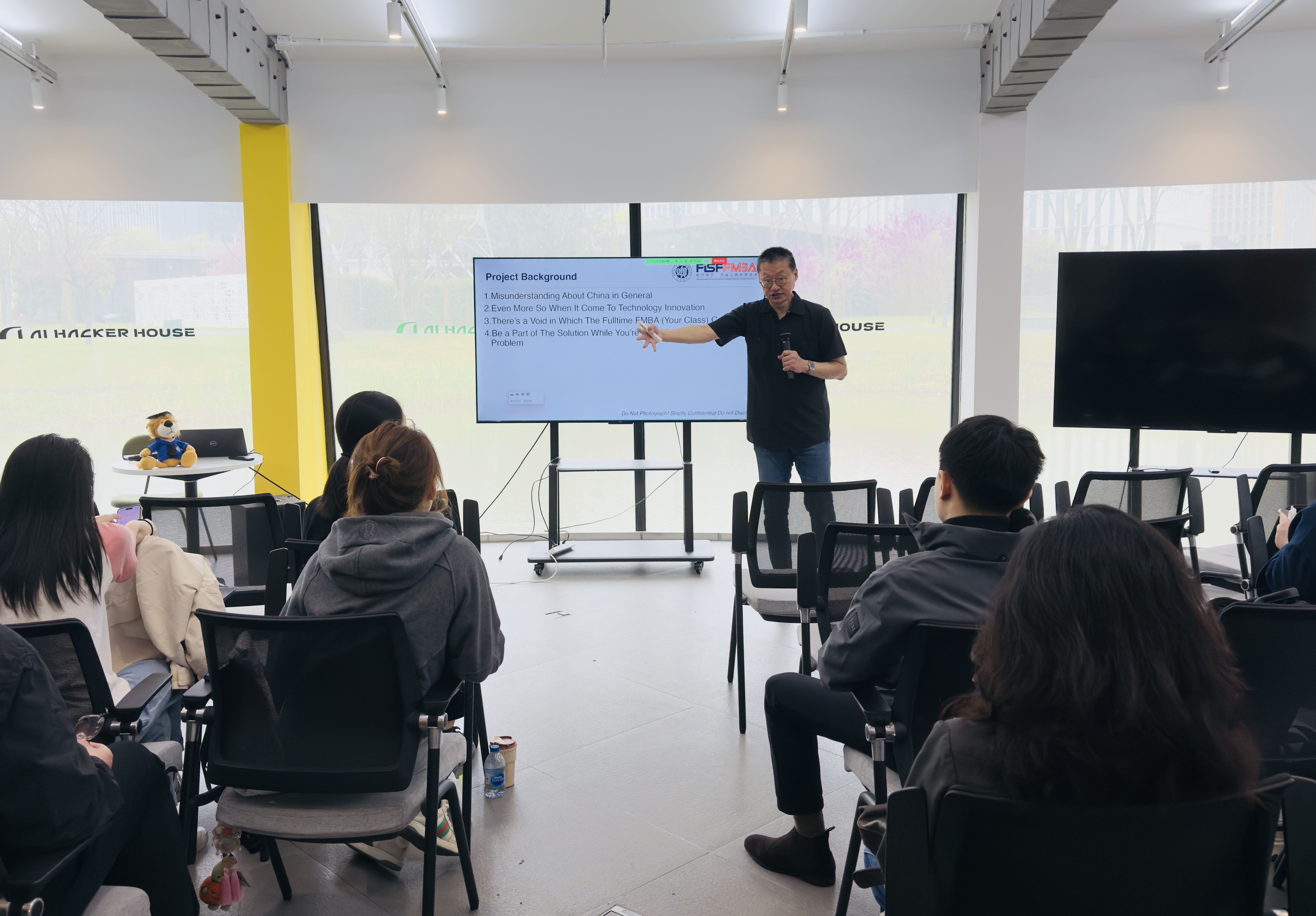
Decoding Regional Industrial Strategies and Sci-Tech Investment Setup
· Shanghai Xuhui District’s "Policy Highlands to Innovation Rainforest"
Xuhui boasts a ¥100B (RMB) + AI industry (2024) and accounts for nearly 60% of Shanghai’s large-scale AI model filings. Its success hinges on a "space-policy-ecosystem" trifecta, including mega-developments like Xihai Digital Valley and Beiyang AI Town. The district’s "6 functional + 12 specialized policies" prioritize incubators like Caohejing’s Mosu Space, which slashes R&D risks by 40% through shared computing power and data resourcing.
· Shanghai Humanoid Robotics Innovation Incubator: Vertical Integration + Synergy
Deputy General Manager Nicolai Huang highlighted the incubator’s "hardware + capital + selection" model:
R&D Infrastructure: Simulated urban environments, 3D-printing hubs, and a robotics “supermarket” where you can pick up essential parts to build your own robot.
Capital Loop: A ¥20M early stage fund for "0-to-1" breakthroughs and a ¥1B industrial fund partnering with state-backed capital.
Dynamic Optimization: Annual elimination of over 30% projects based on tech novelty and commercialization milestones.
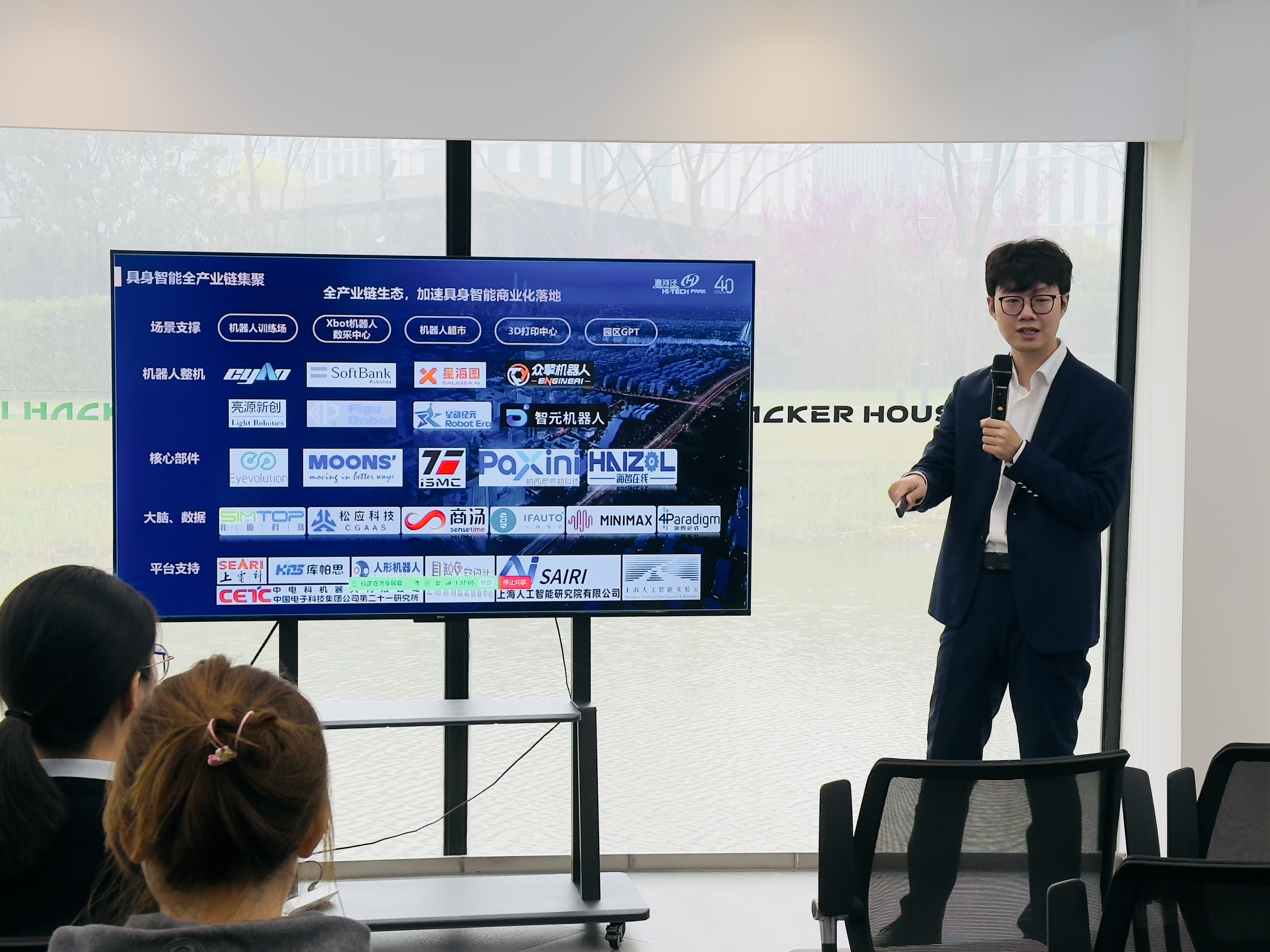
· Caohejing Development Corp.’s Investment Philosophy - Alumnus Wang Zilv (FISF EMBA 2021) outlined the park’s "asset-light, service-strong" strategy:
Scene-for-Equity Swaps: Opening smart campus/logistics systems support to startups for tech validation.
Dual-Track Talent Model: Partnering with universities to embed PhDs as CTOs.
everse Innovation: Defining downstream needs (e.g., robots for elderly care) to drive upstream R&D in flexible joints/sensors.
This "investment-incubation-commercialization" loop attracted 736 foreign firms and 234 scale-ups across sectors like semiconductors, biomedicine and others.
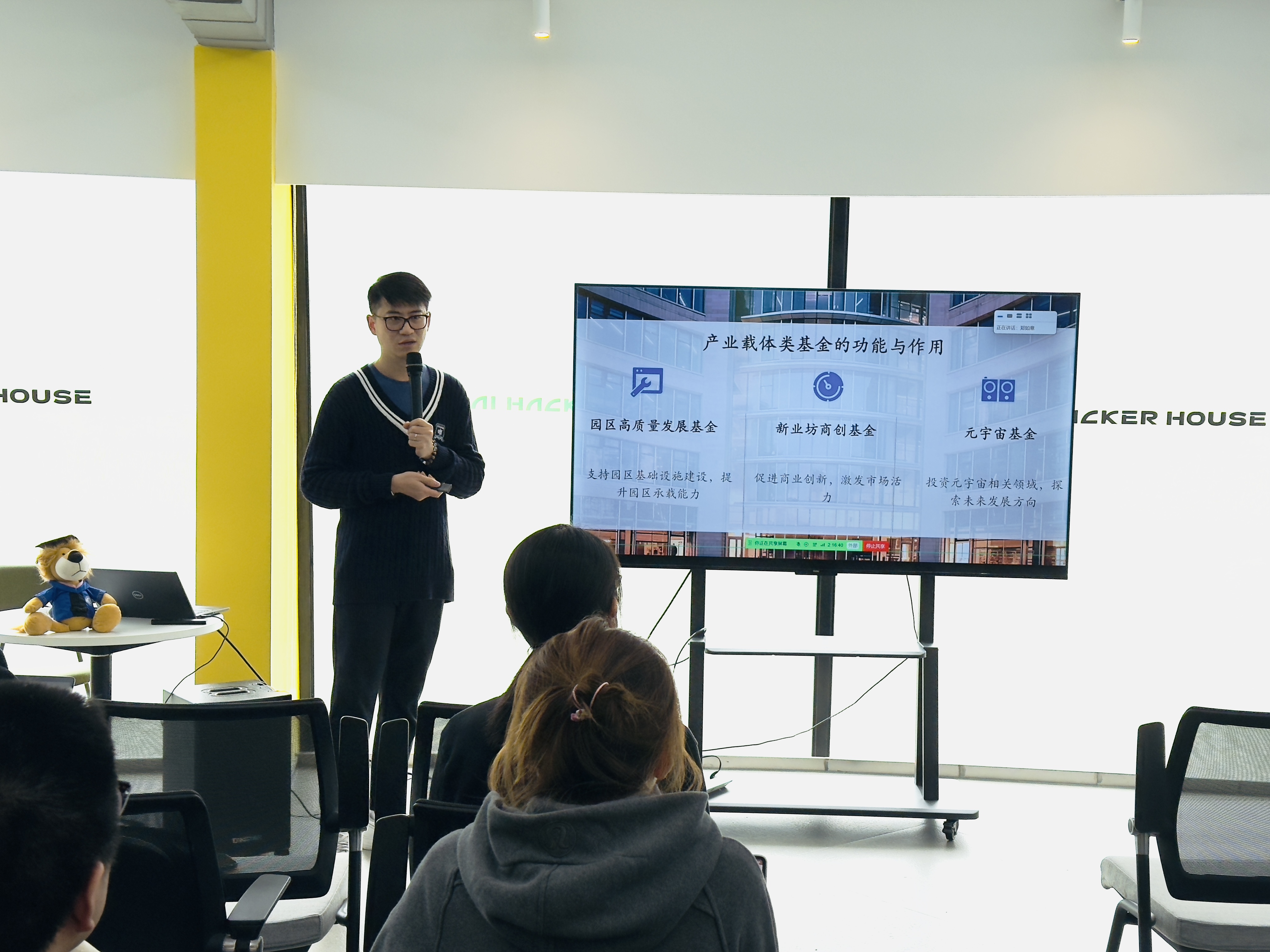
· Visiting Caohejing’s Humanoid Robot Incubator
Students toured four standout startups:
Eyevolution Technology: Rail transit bow-net monitoring solutions deployed in Shanghai Metro (winner of the 2024 National Disruptive Tech Award).
Partner Robot: Modular cleaning robots (e.g., silent PAIMO floor scrubbers for commercial spaces).
Yousimeidi Robotics: Agricultural weeding robots using AI-spectroscopy for mm-level crop/weed differentiation, serving 500+ farms in the Yangtze Delta and now focused on export markets.
Orca I by Cyan: A humanoid robot mastering bipedal mobility (walking, climbing, recovery) without mechanical stiffness.
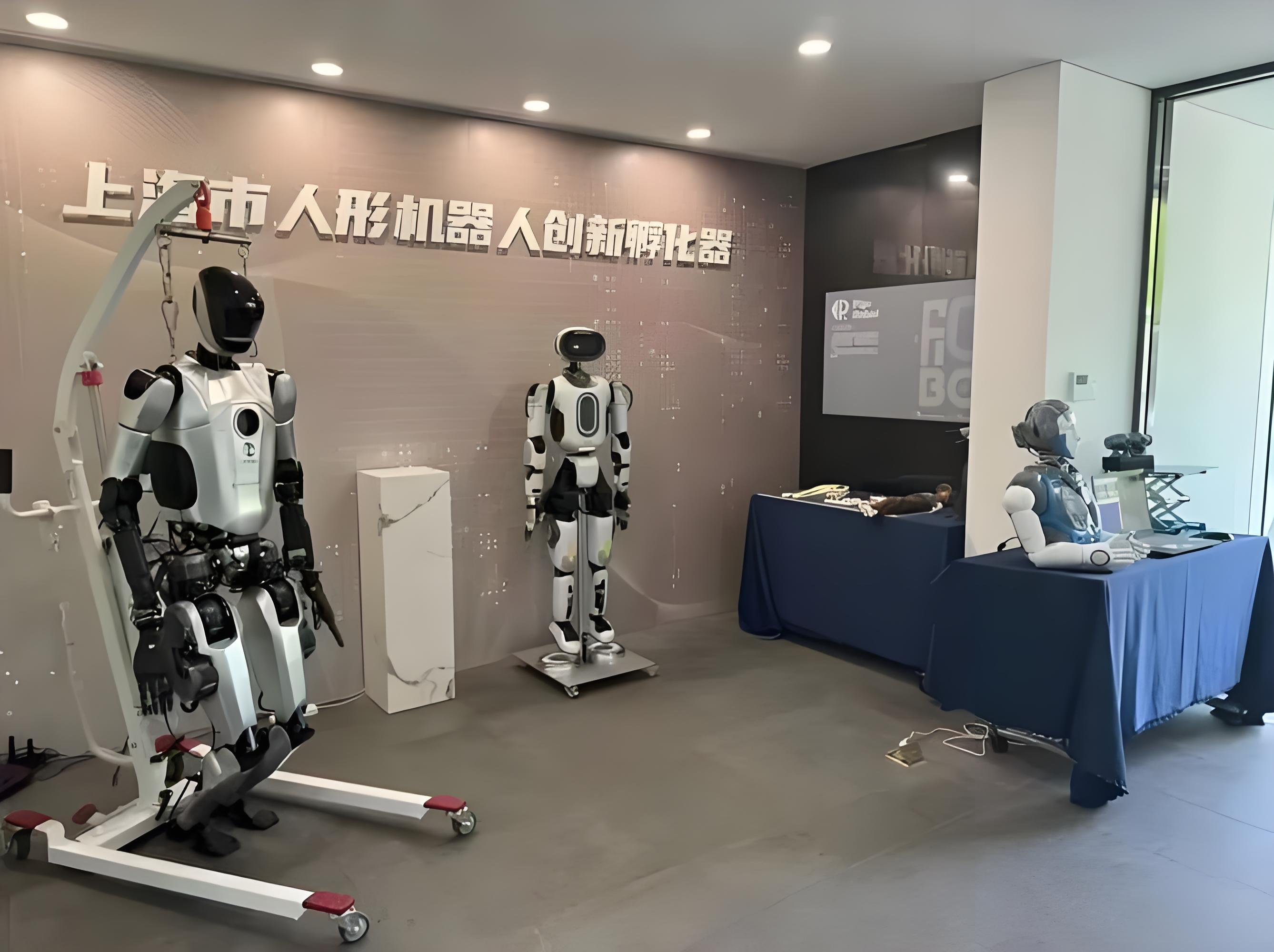
· Whitepaper Workshop: Synthesizing China’s Tech Drivers
Using the Feishu collaboration tools (Bytedace), students crafted a whitepaper analyzing:
Market dynamics and national policies (Shanghai’s innovation hubs).
Incubator setup • Incubator for robotic startups.
Financing trends and ethical implications of robotics.
This exercise reinforced L.I.T.E. principles - Leadership, Innovation, Teamwork, Ethics - while equipping future leaders in finance with cross-disciplinary skills.
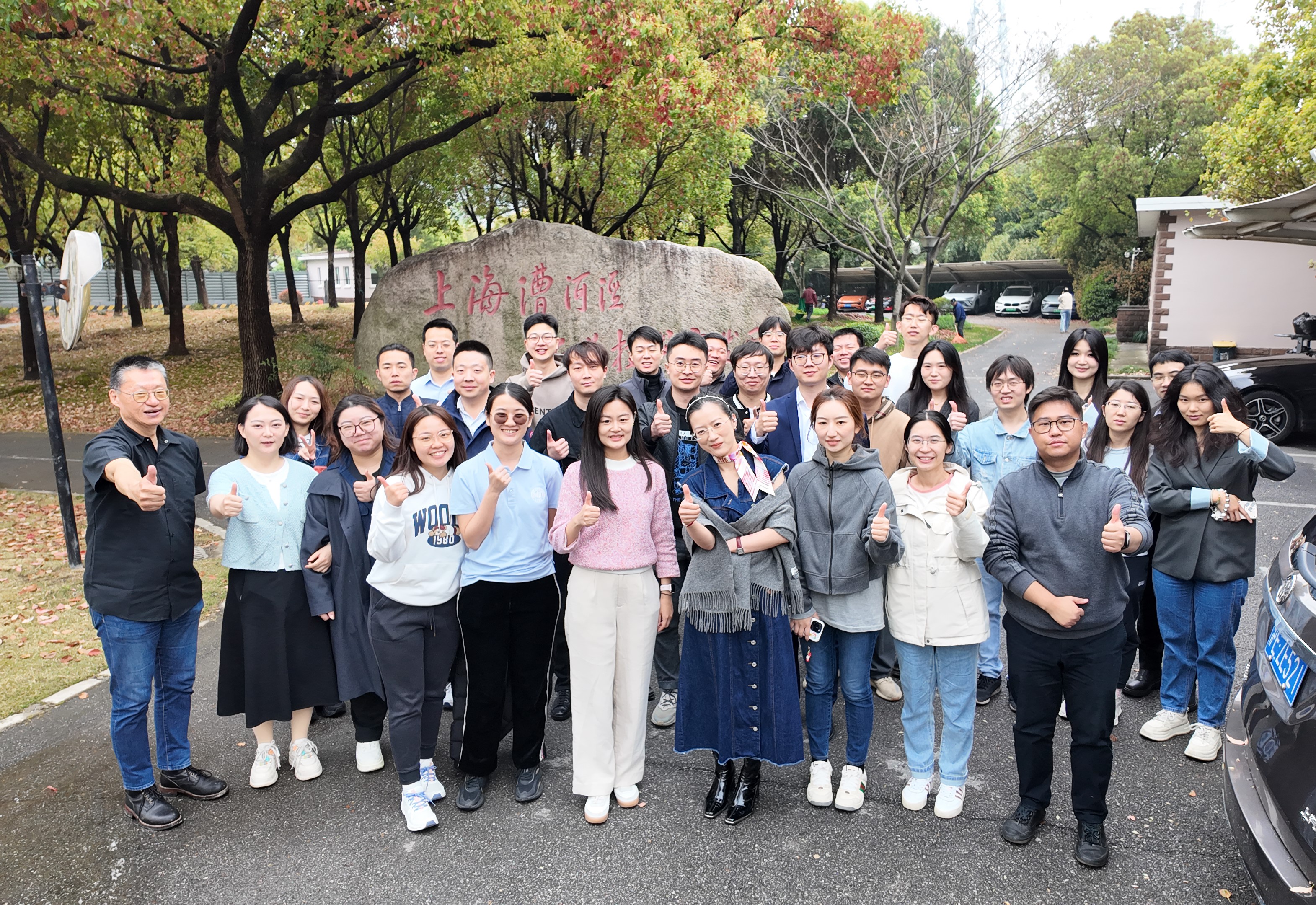
Student Reflections
· George Han: "Witnessing Caohejing’s ecosystem firsthand reinforced Shanghai’s role as a leading global tech hub."
· Janessa Wei: "The course blended cutting-edge tech with practical strategies—inspiring!"
· Jessica Boy: "Caohejing’s policy-finance-ethics triad exemplifies China’s innovative leadership."
Key Takeaway: China’s tech ascendance isn’t about isolated breakthroughs but ecosystem orchestration - melding policy, capital, talent, and application scenarios. Courses like L.I.T.E. prepare future financiers to navigate this paradigm, blending global perspectives with localized insights.
For more on Fudan’s full-time Financial MBA: https://fisf.fudan.edu.cn/en_page-enFT_MBA.html
Email: ftmba_fisf@fudan.edu.cn